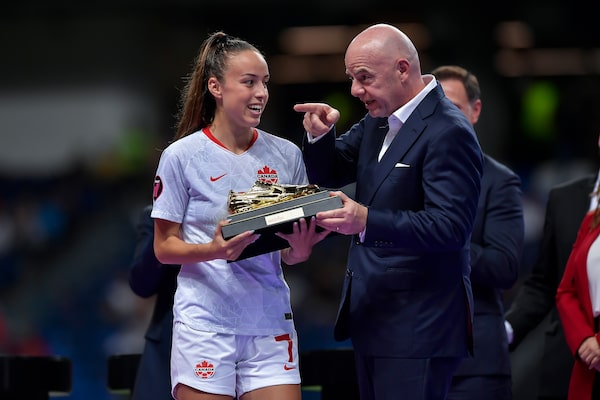
Julia Grosso of Canada talks to Gianni Infantino President of FIFA after the championship match between United States and Canada as part of the 2022 CONCACAF W Championship at BBVA Stadium on July 18.Azael Rodriguez/Getty Images
The CONCACAF W Championship final played on Monday night in Monterrey, Mexico, settled a few things. The U.S. women’s team is going to the 2024 Summer Olympics in Paris. Canada must play Jamaica in home-and-away playoff matches next year to get there, too. Canada can do that, the Olympic gold medallists having beaten Jamaica in a breezy 3-0 win at this tournament.
Earlier in this tournament, another matter was settled – Canada is going to the FIFA Women’s World Cup in Australia and New Zealand next year, along with the U.S. Two Canadian national teams at consecutive World Cups is a thing to behold, with the men’s team qualified for Qatar, but this set of matches in Mexico against teams from North and Central America revealed more than it settled.
This was World Cup champions against Olympic champions and the revelations about the Olympic champs are worrying. There’s work to be done.
This Canadian team really faced only one top opposition team at this CONCACAF championship and that of course, is the U.S. In Monday’s game Canada’s fragility was all too obvious. There was a period early in the second half when the U.S. was threatening to score, over and over. The colour commentator on TV said the U.S. was “knocking at the door.” Not true. The American strikers were battering the door that is Canada’s defence and tearing it apart with shocking ease.
It took a rather dubious penalty awarded in the 75th minute to settle the game with a 1-0 victory for the Americans. Rose Lavelle was alleged to have been fouled from behind inside the box by Canada’s Allysha Chapman. Alex Morgan scored it with aplomb, but all the aplomb in this match belonged to the U.S. While Canada, until the final few minutes, looked as dubious as that penalty call.
The defence is well-organized and fierce, unlike the rest of the team. For long periods in this match, Canada displayed neither fluidity nor cleverness. Goalkeeper Kailen Sheridan made countless saves and, in front of her, heroic work by Kadeisha Buchanan and Vanessa Gilles – the latter being the toughest of all 22 players on the field – kept the score at 0-0 for a long time.
The Americans, playing a 4-3-3 formation, were on the attack from the get-go. Forward Mallory Pugh forced a save with a tremendous strike just 45 seconds in; four minutes later, Sophia Smith controlled the ball beautifully and found Morgan just inside of the penalty area, but Morgan’s curled shot went wide. Soon after, midfielder Lindsey Horan also came close. What this told us was the Americans had done research; the long-distance shots were meant to avoid close encounters with Buchanan and Gilles.
Meanwhile, Canada responded mainly through forward Nichelle Prince, who can certainly dribble past defenders but, after watching that trick multiple times, it amounted to Prince running down blind alleys either oblivious to support or ignoring her own attacking colleagues. Janine Beckie was everywhere, as usual, and Ashley Lawrence was trying to organize a scattered midfield. Christine Sinclair was almost invisible, passes went astray and, really, there was no orchestration in forward movement. None.
The positive take-away from what was a withering loss – one goal decided it but Canada was outclassed and outplayed for long periods – is the burst of attacking play that came late and after multiple substitutions.
The arrival of Julia Grosso in the 57th minute and then Jordyn Huitema and Adriana Leon, changed everything. Finally, Canada looked like a goal-scoring team, intent on co-ordinated attack, getting the ball into the box and, after the U.S. took the lead through that penalty, Canada looked dangerous. Beckie, much more comfortable with attacking players she could feed the ball to, found a second wind. Grosso looked unintimidated, Leon had confidence and in those last few minutes it was sheer bad luck that the ball couldn’t find Huitema, a player who at last looks like reaching her potential as a demon in front of goal.
Nine of Canada’s starting 11 on Monday played against the U.S. in that Olympic semi-final last year. But only five American players who started against Canada at the Olympics were in the starting lineup. Canada head coach Bev Priestman has decisions to make about revitalizing this team with young, gifted strikers who start, rather than take the field late in the game. Besides, as the men’s team will discover, being great in the CONCACAF arena doesn’t mean all that much in the bigger, tougher world, where truly top opposition awaits.